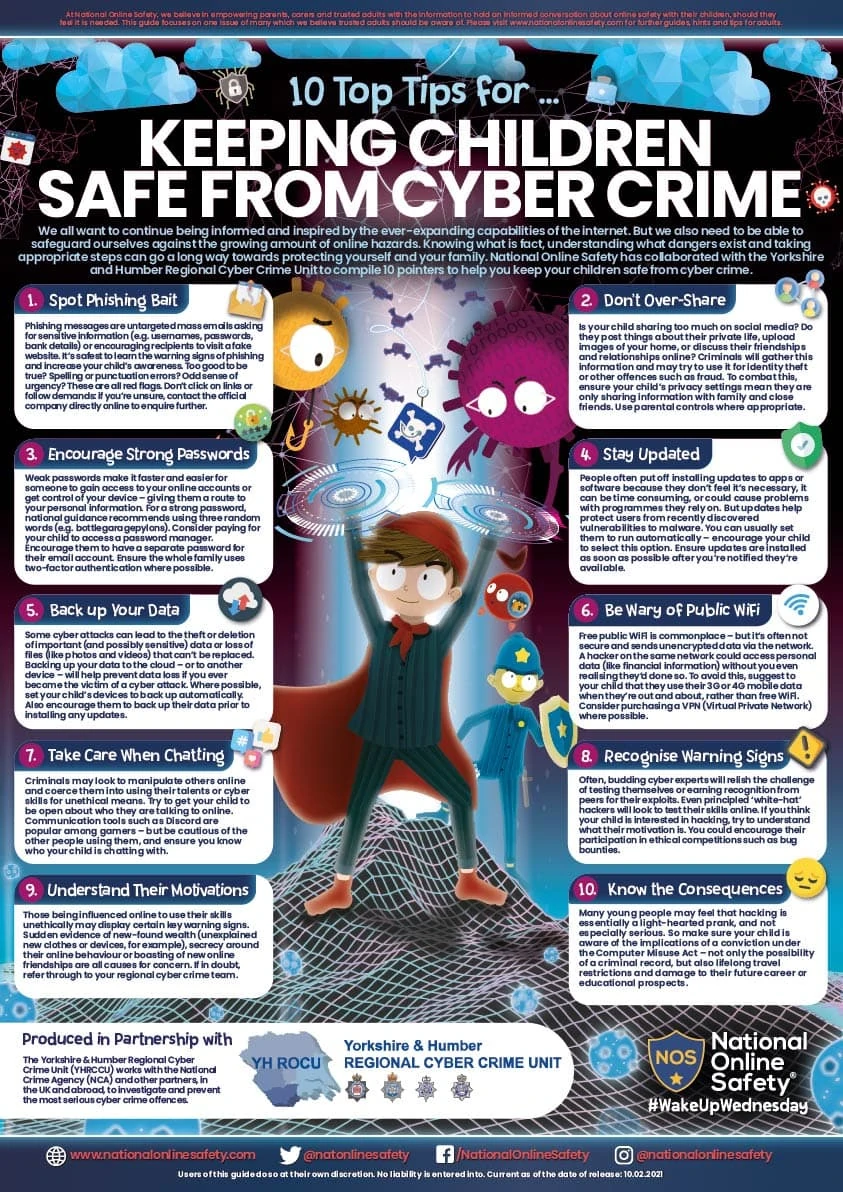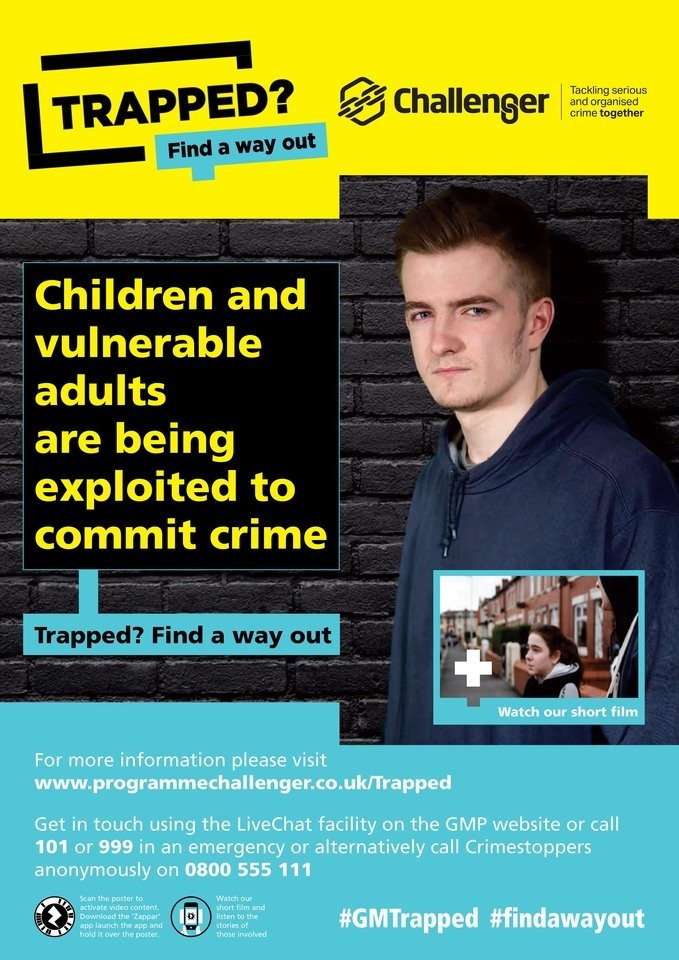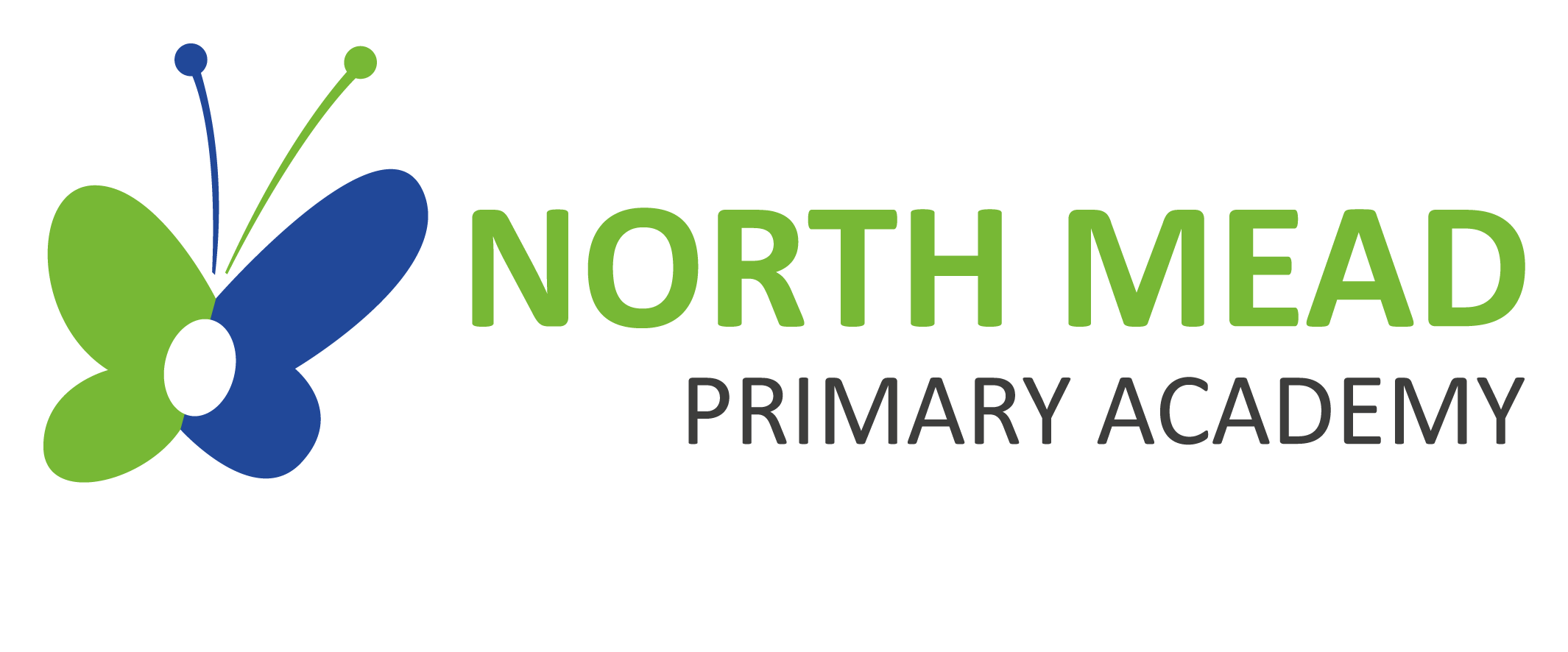Child Criminal Exploitation and Child Sexual Exploitation
Both CCE and CSE are forms of abuse that occur where an individual or group takes advantage of an imbalance in power to coerce, manipulate or deceive a child into taking part in sexual or criminal activity, in exchange for something the victim needs or wants, and/or for the financial advantage or increased status of the perpetrator or facilitator and/or through violence or the threat of violence. CSE and CCE can affect children, both male and female and can include children who have been moved (commonly referred to as trafficking) for the purpose of exploitation.
Child Criminal Exploitation
Organised criminal groups or individuals exploit children and young people due to their computer skills and ability, in order to access networks/data for criminal and financial gain. There are a number of signs that may indicate a child is a victim or is vulnerable to being exploited which include:
- Missing from education
- Show signs of other types of abuse/aggression towards others
- Have low self-esteem, and feelings of isolation, street or fear
- Lack trust in adults and appear fearful of authorities
- Have poor concentration or excessively tired
- Become anti-social
- Display symptoms of substance dependence
- Excessive time online computer/gaming forums
- Social Isolation in school with peers
- High functioning with an interest in computing
County Lines and Child Financial Abuse
County lines is when drug networks or gangs groom and exploit children and young people to carry drugs and money from urban areas to suburban and rural areas, market and seaside towns. County Lines is a term used when drug gangs from big cities expand their operations to smaller towns, often using violence to drive out local dealers and exploiting children and vulnerable people to sell drugs.
A common feature in county lines drug supply is the exploitation of young and vulnerable people. The dealers will frequently target children and adults – often with mental health or addiction problems – to act as drug runners or move cash so they can stay under the radar of law enforcement.
People exploited in this way will quite often be exposed to physical, mental and sexual abuse, and in some instances will be trafficked to areas a long way from home as part of the network’s drug dealing business.
An increasing number of children and young people are finding themselves the victims of financial fraud / exploitation, e.g., being groomed online to open bank accounts and launder money. This is known as Child Financial Abuse (CFB). Criminals befriend young people through social media and online games. They offer them gifts, promise money, gaming credits, skins or cryptocurrency. Once they’ve gained a young person’s trust, they force them to carry out fraudulent activities, like opening a bank account for them. This is financial exploitation.
Cybercrime
Cybercrime is criminal activity committed using computers and/or the internet. It is broadly categorised as either ‘cyber-enabled’ (crimes that can happen off-line but are enabled at scale and at speed on-line) or ‘cyber dependent’ (crimes that can be committed only by using a computer). Cyber-dependent crimes include:
- unauthorised access to computers (illegal ‘hacking’), for example accessing a school’s computer network to look for test paper answers or change grades awarded
- ‘Denial of Service’ (Dos or DDoS) attacks or ‘booting’. These are attempts to make a computer, network or website unavailable by overwhelming it with internet traffic from multiple sources, and,
- making, supplying or obtaining malware (malicious software) such as viruses, spyware, ransomware, botnets and Remote Access Trojans with the intent to commit further offence, including those above.
Children with particular skills and interest in computing and technology may inadvertently or deliberately stray into cyber-dependent crime.
If there are concerns about a child in this area, the safeguarding lead may refer them into the Cyber Choices programme. This is a nationwide police programme supported by the Home Office and led by the National Crime Agency, working with regional and local policing. It aims to intervene where young people are at risk of committing, or being drawn into, low-level cyber-dependent offences and divert them to a more positive use of their skills and interests. Note that Cyber Choices does not currently cover ‘cyber-enabled’ crime such as fraud, purchasing of illegal drugs on-line and child sexual abuse and exploitation, nor other areas of concern such as on-line bullying or general on-line safety.
Additional advice can be found at: Cyber Choices, ‘NPCC- When to call the Police’ and National Cyber Security Centre – NCSC.GOV.UK.
Groomers will hide their true intentions and may spend a long time gaining a child’s trust though a range of mediums including social media platforms. Section 67 of the Serious Crime Act 2015 (offence of Sexual Communication with a Child) which came into force on 3 April 2017 also applies to Sexting and Grooming and our staff are fully aware of the legislation (https://www.gov.uk/government/publications/circular–
201701–sexual–communication–with–a–child–implementation–of–s67–of–the–serious–crime–act–2015).
Grooming Models include:
- The relationship / peer model
- Organised / network model & trafficking model
- Inappropriate relationship model
- Gangs model
- Online Gaming / Social Networks

Knife Crime
Put simply, knife crime is a crime that involves a knife.
Knife crime includes:
- carrying a knife
- trying to buy a knife if you are under 18
- threatening someone with a knife
- owning a banned knife
- injuring or fatally wounding somebody with a knife
- intent to injure or harm somebody with a knife
- a robbery or burglary where a knife was carried as a weapon
What’s the law?
For simply carrying a knife in a public place or on school premises, the maximum penalty if convicted is four years in prison. Those found on more than one occasion to be in possession of a knife face a minimum sentence of six months.
For offences when a knife is used on another person or in the commission of a crime (i.e. street robbery), the punishments become even more life-changing.
Using a knife or another bladed instrument, depending on the circumstances and nature of injuries caused, can lead to offenders being charged with a range of offences, from assault to Section 18 Causing Grievous Bodily Harm (GBH) with intent, from attempted murder to manslaughter and ultimately murder.
Such offences can lead to many years in prison. While committing murder carries a mandatory life sentences, offenders can also be sentenced to life in jail for committing a Section 18 GBH offence.
If someone is injured or killed by a knife while you are present you too could be prosecuted. You could potentially be sent to prison for murder in a ‘joint enterprise’.
You matter, lives can change #LivesNotKnives
Within Leicester, May 2019 saw 237 reported incidents involving a knife or bladed instrument which was an increase of 30 from the previous month.
Sexual Exploitation
Child Sexual Exploitation is a form of abuse and occurs when an individual or group takes advantage of an imbalance of power to coerce, manipulate or deceive a child into sexual activity. Sexual exploitation can take many forms ranging from seemingly consensual relationships to serious gang and group exploitation.
Our staff are aware that sexual exploitation can take many forms and that pupils may not exhibit external signs of abuse. Our staff are also aware that it is an offence carrying a maximum sentence of two years imprisonment where an adult (any adult) intentionally communicates (for example, by email, text message, written note or orally) with a child under 16 (whom the adult does not reasonably believe to be aged 16 or over) for the purpose of obtaining sexual gratification. This act forms part of Section 67 of the Serious Crime Act 2015 (offence of Sexual Communication with a Child) and came into force on 3 April 2017.
https://www.gov.uk/government/uploads/system/uploads/attachment_data/file/604931/circularcommencement–s67–serious–crime–act–2015.pdf
Therefore, our staff are vigilant for the less obvious signs, such as lots of new electronic equipment, when before there was none, seeming to have extra money to spend, moving away from established friendship groups, and the use of language appropriate/inappropriate for the child’s age. Our staff are also aware of some of the signs and symptoms of CSE through LSCB Leaflets (https://www.lcitylscb.org/safeguarding–leaflets/), staff induction and as part of our annual Whole School Safeguarding Training.
Our staff follow guidance and procedures as outlined in ‘Safeguarding Children and Young People from
Sexual Exploitation in Leicester, Leicestershire and Rutland’ available on the LSCB website (Safeguarding Children and Young People from Child Sexual Exploitation (proceduresonline.com). Child Sexual Exploitation disclosures will be reported immediately to the Removing Barriers Team or directly to Duty & Advice (0116 454 1004).
Child sexual exploitation can occur in different ways and in different situations. Many young people are ‘groomed’ by their abuser, online or face-to-face. Grooming is an action deliberately undertaken with the aim of befriending and establishing an emotional connection with a child, to lower the child’s inhibitions with the intention of sexually abusing them.
Serious Violence, Gang Violence and Youth Crime

A gang is group of individuals that spends time in public and engages in criminal activity and violence. The group may also be territorial or in conflict with other gangs. Young people involved in gangs have an increased risk of experiencing violence and other types of abuse including sexual exploitation. Gang crime and serious youth violence is also often synonymous with knife crime and other serious violence.
Most young people and education establishments will not be affected by serious violence or gangs. However, where these problems do occur there will almost certainly be a significant impact.
Gangs specifically target children who have been excluded from school to groom them as drug dealers in towns across the UK. Exclusion from school appears to be a highly significant trigger point for the escalation of County Lines involvement for children who might be on the fringes of such activity or who are easily manipulated.


 Together We Make A Positive Difference
Together We Make A Positive Difference